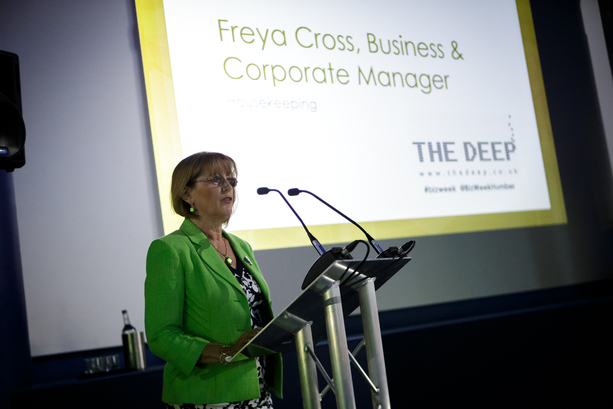Balancing act for Deep Business Centre as report highlights growth

Freya Cross, business and corporate manager at The Deep.
ONE of the region’s leading business centres is bucking the trend by pegging prices and improving quality in a rapidly expanding sector.
As occupancy levels nationally and regionally dropped during 2014, the Deep Business Centre held its own and increased value for tenants by adopting a flexible approach.
Freya Cross, business and corporate manager at The Deep, said clients will expect more of the same and operators will have to deliver as competition intensifies and Brexit takes effect.
Mrs Cross is a member of the board of the Business Centre Association (BCA), which paints a picture in its latest annual report of a buoyant and diversifying sector which has thrived in some difficult terrain.
She said: “The latest report looks at the breakdown of activity areas within the BCA during 2014, the prices that centres charged and the occupancy levels that they achieved.
“The findings are interesting and will support a rapidly-growing sector in its lobbying of the Government but there is a view that the next report should cover 2015 and 2016 jointly to capture the early impact of Brexit.”
The BCA report was based on responses from 47 operators of 647 centres, including serviced offices, managed offices and light industrial units representing around 28 per cent of the total market.
Findings indicate that the sector grew by 32 per cent during 2014, contributing £8 billion to GDP as employment in the sector increased by 19 per cent with 26,000 new and expanding businesses supporting 135,000 workers.
Jennifer Brooke, BCA executive director, said: “The business centre sector continues to go from strength to strength, punching well above its weight in an increasingly competitive environment. Flexibility is key to economic success.
“Despite uncertainty on the wider economic horizon in the wake of Brexit the sector is in an exceptionally strong position to withstand business challenges. The report highlights the resilience of the business models which make the sector so successful.”
Serviced offices performed particularly well nationally but in Yorkshire and Humber light industrial was stronger than in any other region, with almost 1.2 million square feet of space. Occupancy rates across the region fell from 75 per cent in 2013 to 71 per cent against a national level of 80 per cent.
Prices for serviced offices increased by 10 per cent, better than anywhere else in the north of England but well behind the UK average of 26 per cent.
The report also suggested that price is the key factor in choosing a business centre outside London, but in the capital the emphasis is on quality and service, with technology increasingly important.
Mrs Cross said her strategy of striking a balance was helping to maintain performance at The Deep Business Centre, where more than 40 tenants employ over 200 people.
She said: “Our occupancy levels were ahead of the regional and national average at 90 per cent but we have held our prices and become more flexible and adaptable to look after the needs of our tenants.
“I expect future reports to indicate even higher demand for business centre space because it is a flexible option for businesses that do not want to get involved in property issues. At the same time there is much more competition. In Hull alone during the last year we have seen the arrival of one of the world leaders in Regus and the emergence of a number of smaller, local centres.”






















